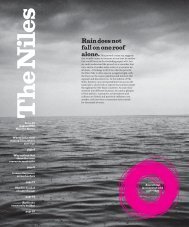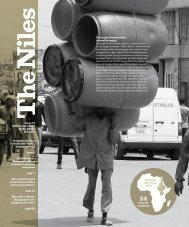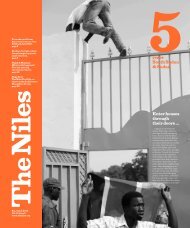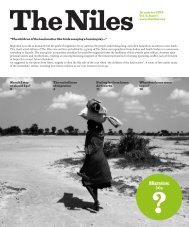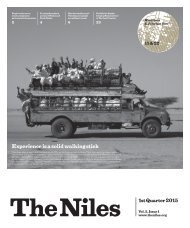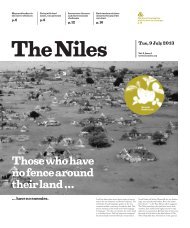We are what we eat
The food we eat literally determines who we are. It influences our physical, mental and even emotional well-being. From Egypt’s Cairo to Burundi’s Gitega, this issue of The Niles attempts to explore the essentials of food: from conflict and food insecurity to the sensory aspects of preparing and eating national dishes.
The food we eat literally determines who we are. It influences our physical, mental and even emotional well-being. From Egypt’s Cairo to Burundi’s Gitega, this issue of The Niles attempts to explore the essentials of food: from conflict and food insecurity to the sensory aspects of preparing and eating national dishes.
You also want an ePaper? Increase the reach of your titles
YUMPU automatically turns print PDFs into web optimized ePapers that Google loves.
Help the smallholder farmer to end hunger
in the Nile Basin
The bulk of food in the Nile Basin comes from small farmers. Once they are adequately supported,
it could bring an end to food insecurity in a region rich enough in resources to feed everyone.
Henry Lutaaya
Kampala, Uganda
Respect the river that
nourishes us
To feed the growing number of people who will rely
on the Nile in coming years, all countries in the basin
must ensure that the river is used sustainably.
Tuver Wundi
Goma, Democratic Republic of Congo
All countries in the Nile Basin, with the exception of Egypt, have
been classified as some of the world’s most food insecure countries
in the Food and Agricultural Organisation’s (FAO) 2018 Global
Hunger Index.
The recurrent state of food insecurity in most countries in
the Nile Basin, be it limited quantity or quality, is an embarrassing
situation considering the abundant opportunities in the form of
vast swaths of arable land, favourable climate, water and knowledge
available to produce enough food to feed the people, and perhaps
sell the excess in regional and international markets.
Food insecurity also inflicts severe and lasting damage to
the health of people by limiting their mental and physical abilities
through poor nutrition.
Because the bulk of the food in our countries comes from
smallholder farmers (who are also the majority of the population), defeating the problem of food insecurity,
therefore, has to start with addressing the challenges facing the smallholder farmer. It also means that lifting
the farmer from a destitute situation into a prosperous one, will have a multiplying effect on the wider
economy. Doing so will unleash numerous economic opportunities such as markets for the much-touted
industrial and service sectors, which will create integrated and self-sustaining economies.
The challenges facing smallholder farmers range from an increasing shortage of land due to bulging
populations and undernourishment of the soil, as well as limited access to good quality seeds and welldeveloped
value chains for the crops grown.
Take maize, for example, which is the biggest staple crop on the continent. Increased maize output
has come largely through increased expansion of the cultivated land rather than through increased production
per acre. Farmers too have not realised much income from the crop because of the low levels of processing
and low levels of integration into other industries needed to turn the crop into a high-value commodity
that goes beyond its use as food.
The challenge of food insecurity has been compounded by the rising impacts of climate change
and climate variability, rapid increases in population vis-a-vis limited land and water resources.
The greatest challenge stems from the lack of political commitment at all levels to prioritise the agricultural
sector as the cog in the wheel of our economies. The failure of most African countries to fulfil
their commitments to boost investments in the agricultural sector by at least 10 percent of annual resources,
as per the Malabo Declaration of 2014, is a clear indicator that many leaders attach low importance to the
sector that supports the majority of the population and upon which the goals of ending hunger, poverty and
unemployment are anchored.
Only a few Nile Basin countries such as Ethiopia and Rwanda, have implemented the Malabo Declaration
and improved their food security.
Increased investments in the sector would go a long way in developing the value chain of food crops
and thereby reduce losses arising from poor post-harvest handling, another major contributor to food
insecurity. Supplementing rainfed farming with irrigation is a necessary step in countering the recurrent
effects of climate change that have increased in frequency in recent years.
Collaboration amongst countries through trade, sharing of resources and knowledge are critical in
ensuring that food reaches those who need it the most, regardless of national borders. The collaborative
development of transport and energy infrastructures in the Nile Basin needs to be supported to achieve
the desired economic integration of our various countries.
This collaboration can be moved a notch higher by ensuring that counties share knowledge and experiences
in producing food that best suits the ecological conditions of that country without undermining
the greater good of the community.
Building and strengthening platforms for cooperation such as the East African Community, and the
Nile Basin Initiative have been essential in mitigating wars and conflict that have proved to be major causes
of hunger, according to the Global Hunger Index report 2015.
Mindset changes among individual farmers that allow them to tap into available modern knowledge
of food production and marketing can also go a long way towards countering the challenge of food insecurity.
With rapid advances in scientific research and technology, Nile Basin countries have all the necessary
tools to escape the curse of food insecurity.
The population in the Nile Basin
is expected to more than double
by 2050 to nearly one billion,
increasing the demand for food
and putting scarce water resources
under ever greater strain.
More than 80 percent of the
Nile’s water consumption is used for agricultural
purposes, according to Innocent Ntabana, former
Executive Director of the Nile Basin Initiative (NBI).
Efficient water use, he says, requires good land and
agricultural management, which needs an entire
basin approach to tackle food insecurity.
Agricultural commerce, according to NBI, is an
opportunity to tackle poverty as well as food insecurity.
The decision to locally produce or to import must
be based on calculating how much water is used
in both cases.
Food security and the provision of sufficient
resources is at the centre of this issue of The Niles.
Stories from across the Nile Basin focus on the
nexus of water and food security while offering
a glimpse of culinary crossing points and divergences
in food-related cultural practices.
This theme is observed from different angles
to share diverse experiences of the people who live
along the 6,695 kilometres of the Nile and its basin,
a shared source of wealth and survival for over 300
million people.
5
TN14_20191203_II.indd 5 2019/12/03 10:08









